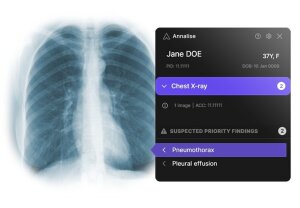by
John R. Fischer, Senior Reporter | November 07, 2023

Annalise Triage has 12 FDA-cleared algorithms designed for radiology triage. (Photos courtesy of Annalise.ai)
Annalise.ai has launched Annalise Triage, a 12-algorithm platform that prioritizes suspected critical findings on chest X-rays and non-contrast head CT scans to allow providers to diagnose and treat urgent conditions sooner.
The release follows 510(k) clearance for the solution in September, along with breakthrough designation status
granted for its detection of obstructive hydrocephalus, making it the first radiology triage device to receive such a distinction. Breakthrough designation status is exclusively provided to devices that are identified as being able to enhance the diagnosis or treatment of life-threatening or irreversibly debilitating conditions.
The algorithms are designed to diagnose cases of acute subdural hematoma, acute subarachnoid hemorrhage, intra-axial hemorrhage, intraventricular hemorrhage, obstructive hydrocephalus, mass effect, vasogenic edema on head CT scans, pleural effusion, pneumoperitoneum, vertebral compression fracture, pneumothorax, and tension pneumothorax on chest X-rays.



Ad Statistics
Times Displayed: 2872
Times Visited: 27 Fast-moving cardiac structures have a big impact on imaging. Fujifilm’s SCENARIA View premium performance CT brings solutions to address motion in Coronary CTA while delivering unique dose saving and workflow increasing benefits.
“With its set of clearances, Annalise.ai promotes faster report turnaround times by identifying and elevating critical cases for immediate attention,” said Dr. Rick Abramson, chief medical officer at Annalise.ai, in a statement.
Along with faster turnaround time, the company says that incorporating AI into worklist triaging decreases the time between when a request is made and when a report is available. It also will help alleviate the effects created by radiology workforce shortages and manage the increasing backlog of imaging exams that providers are facing.
The algorithms are trained on large and diverse data sets and a pool of more than 140 consulting radiologists.

